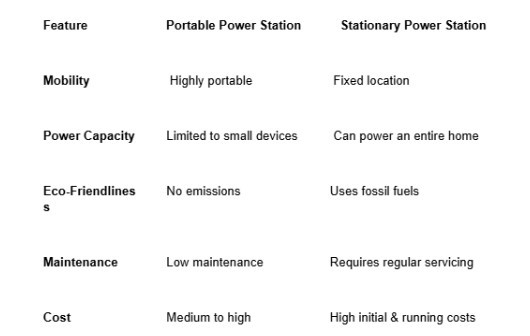Portable vs. Stationary Power Stations: Pros and Cons
Portable vs. Stationary Power Stations: Pros and Cons
From Raheel Bhatti
I'm raising money for a cause I care about, but I need your help to reach my goal! Please become a supporter to follow my progress and share with your friends.
Subscribe to follow campaign updates!
More Info
In the modern world, the use of energy sources that are not only reliable but also environment-friendly has become a necessity. Inserted to: Not only are the power sources safe but also reliable through various modern options and ups that will fulfill one's energy demand. Whether you're preparing for emergencies, enjoying outdoor adventures, or seeking backup power for your home, selecting the right power station is crucial.
Choosing between portable and stationary power stations involves weighing factors like mobility, capacity, environmental impact, and cost. Understanding the pros and cons of each can guide you to the best choice for your energy needs. This article explores the advantages and disadvantages of portable and stationary power stations, helping you make an informed decision.
Portable Power Stations: Pros and Cons
Portability and Convenience: Portable power stations are lightweight to carry and small to store. Because their compact size and low weight make them easy to use.
Eco-Friendly Operation: Mostly used by rechargeable lithium-ion or iron ion phosphate batteries, these stations are made to recharge emission-free batteries. They can be used to produce electricity from solar panels, power plants, or even by the use of car chargers, They are considered to be one of the most promising alternatives of available energy sources.
Silent Functioning: Theus can be very sleep-friendly on the other electric devices' quiet-performance portable power stations. They are eco-friendly and can run silently during their usage. Total energy only comes from solar energy.
Low Maintenance: Moreover, the absence of movable equipment gives the photovoltaic power station owners the ability to devise various structures that use this nonconventional resource, thereby achieving the target of increasing power generation, reducing inequity, and strengthening support to other economic sectors. The fact that it is without a machine or any requirements is the reason for the need for such minimalism more to you.
Limited Capacity: As a result, due to the energy storage restrictions in the portable power stations, it may not allow the usage of large appliances or having a prolonged power supply.
Higher Initial Investment: Also, it requires some investment which is sterling in the case when initial costs went with the units that contain higher specifications and functions.
Dependence on Recharging: They have batteries that tend to run out of energy for operation or not operate at all, which means they have to be recharged regularly. That can be a problem generator during long-time periods when energy sources are unavailable or there is not enough sun for solar-powered recharging.
Stationary Power Stations: Pros and Cons
High Power Output: Also known as standby generators, stationary power stations are electromechanical devices that can produce a lot of power and thus can sustain the whole house or large appliances in case of power outages.
Continuous Power Supply: The generators, which are powered by the homeowner's natural gas or propane supply, are the ones that operate without any time limit and, as a result, supply power even in the hour of darkness, which means that energy is continuous.
Automatic Activation: The stationary type of power sources having automatic power transfer switches gain significant points because they can detect the power cutoffs and immediately start the generator without manual intervention, which is quite impressive for the products offering backup power.
Lack of Portability: They are fixed in one place and thus cannot be moved, not portable, which in turn implies that the use of these items is limited in one location.
Environmental Concerns: The utilization of fossil fuels to power the generators results in emissions of greenhouse gases, which in turn contributes to the pollution of noise that affects the environment and neighborhood noise level.
Higher Maintenance Requirements: Performing regular checks such as oil change and inspection will ensure the machines are operational and reduce money as well as manpower costs of the machines.
Significant Initial and Operational Costs: The cost of the generator, installation fees, fuel, and continuing maintenance can make stationary power stations a very large investment among others than the above costs.
Comparison Table: Portable vs. Stationary Power Stations

Which Power Station Is Best for You?
Go in for a portable power station which becomes pertinent in the case you pursue a weightless, eco-friendly, and rechargeable device that effectively meets the requirements of outdoor activities.
If you need a reliable power backup with a large capacity for residential or business use, then a stationary power station will be the best option for you.
Conclusion
The choice between a portable and stationary power station would rest on certain grounds such as the capacity requirements, budget, and sustainability of the power source for which you may go for portable power station where you get the best option. In fact, mobility, eco-friendliness, and the quiet mode of operation for small devices will be attained by a portable power station. On the other hand, a stationary power station will be a better choice if you need a strong, continuous power supply for a whole house or large appliances and if you are ready to spend more on it but also be prepared for maintenance.
station could be the better choice. Assessing your unique needs will guide you to the most suitable option.
Campaign Wall
Join the Conversation
Sign in with your Facebook account or email.
